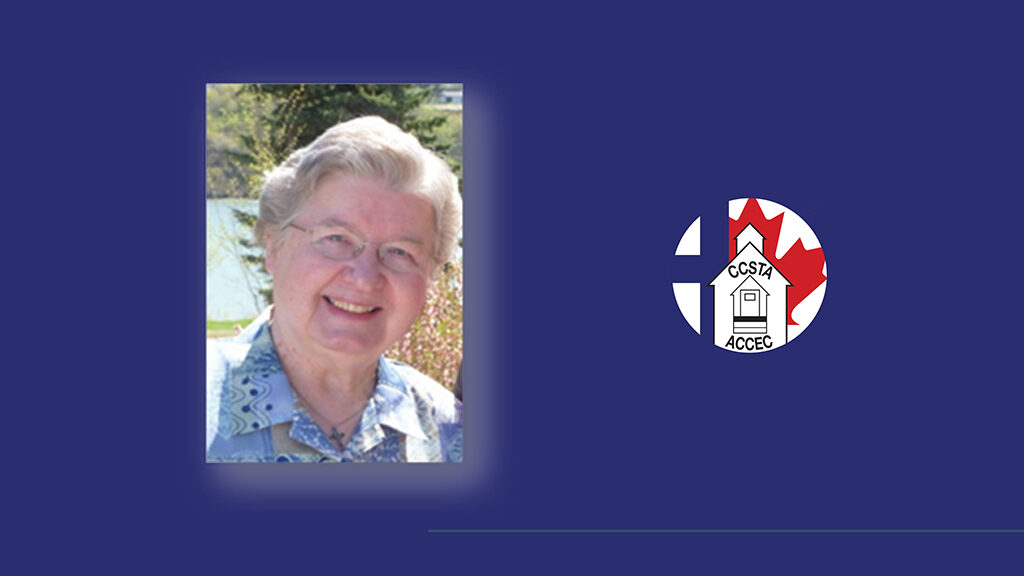
A lifetime of dedication to faith and education has earned Sr. Teresita Kambeitz some well-deserved recognition at the national level; she’s been named the 2018 Higgins Award Winner.
In memory of a distinguished Canadian jurist and Catholic School Trustee, the Honourable Justice James Higgins (1913-1974) of St. John’s, Newfoundland, the Board of Directors of CCSTA annually presents an award to a person or group that has made an outstanding contribution to Catholic education in Canada. The Justice James Higgins Award is the highest honour provided by CCSTA. It reflects recognition of an exceptional contribution to Catholic education in this country. Sr. Teresita is the seventh women to receive the honour since its 1975 inception.
Nominated by the Board of Education of Greater Saskatoon Catholic Schools, Sr. Teresita’s commitment to education clearly hasn’t gone unnoticed by her peers.
Sr. Teresita’s Dedication to Education
Sr. Teresita’s 56‐year tenure spans from 1959 when she began teaching in Tramping Lake, SK through to the present day in her role as Assistant Director of Religious Education for Newman Theological College, Edmonton: Saskatoon extension‐site.
Sr. Teresita contributed many years to the vocation of Catholic teacher. Over 26 years, from 1959 to 1985, she taught in Grades 8 through 12 and fulfilled many roles including principal, 15 years as a teacher of Christian Ethics, and ten years in campus ministry and as a sessional lecturer at St. Thomas More College, University of Saskatchewan.
In the nomination letter, the Board showcased Sr. Teresita’s value as a Teacher, Teacher of Teachers and Leader & Advocate for Catholic Education.
“Sr. Teresita was the consummate Catholic teacher – deeply faithful, talented, brilliant, and possessing a charism that inspired in her students a desire to deepen their faith,” the Board wrote.
After a distinguished teaching career, Sr. Teresita focused her attention on supporting the development of lay Catholic teachers. She recognized the teacher is the heart of the school and foundational to the Catholic school’s ability to realize its mission. In 1988, she established the Master of Religious Education Degree Program at Newman Theological College and served as its Director and Professor for 11 years. She also developed the College’s Certificate Program in Catholic School Administration.
“The impact of this work was not only felt in Alberta, but throughout Western Canada,” the nomination letter declares.
She served 22 years on the Governing Board of St. Angela’s Academy, Prelate, SK, including eight years as Chair and gave summer courses for teachers in the Caribbean, Latvia and South Africa and the University of Regina. She has been the guest speaker at over 300 educational conferences and events and has published articles in several leading Catholic journals.
“Sr. Teresita deeply understands the unique demands placed on a Catholic teacher. Unfortunately, those in various levels of government and beyond do not share this understanding. Sr. Teresita, in her quiet, but clear and determined manner, challenged many of them,” states the Board of Directors.
They outlined how she successfully advocated to develop undergraduate courses in religious education for credit at the University of Saskatchewan as well as procured accreditation of graduate courses in theology and religious education with government agencies in both Alberta and Saskatchewan for teacher classification purposes.
“Sr. Teresita has carried the torch for Catholic education in many other ways, but space does not allow further description,” the Board wrote. “Our Board of Education has witnessed the profound impact of Sr. Teresita’s life‐long dedication on Catholic education and believe it worthy of the Higgins Award.”
The board wasn’t alone in their support.
Fr. Ron Beechinor and Ken Loehndorf wrote letters of support for Sr. Teresita’s nomination.
“In her 56 years of outstanding service to Catholic education in Canada, Sr. Teresita has made significant contributions in a wide variety of capacities,” wrote Mr. Loehndorf. “She has been recognized as a true leader in Catholic education and has constantly embodied the true spirit of servant leadership in all that she does.”
Sr.Teresita’s Response
When she first found out she received the award, Sr. Teresita says her feelings were rather muted and mixed.
“Immediately there came to mind several people who were extremely significant in offering new opportunities to me in educational ministry,” she says.
These people include Father Wilf Murchland, CSC, who, as President of Newman Theological College in the 1980s, had invited her to join the faculty and establish the MRE degree program (only the second Catholic MRE in Canada at the time).
“That was an undertaking of which I could never have dreamed,” she says.
Then in 2009, Mr. Ken Loehndorf, Executive Director of the Saskatchewan Catholic School Boards Association, asked Sr. Teresita to establish the MRE degree for teachers of this province, even “in light of what at the time seemed to be an insurmountable hurdle to get it recognized by government authorities.”
Prior to Father Murchland’s invitation, Sr. Teresita’s religious superior, Sister Rose-Anne Engel, had urged her for several years to pursue a Ph.D. degree.
“So you see, if it had not been for the prompting of others, I would probably have remained happily as a high school teacher,” she explains. “Obtaining a Ph.D. opened unimaginable opportunities for me. “Thus, my positive reaction to [CCSTA] President Gazzola’s call was mixed with a recall of the Gospel words, “But I have only been doing what I’ve been invited or commissioned to do… ” (A paraphrase of Luke 17:10).”
Catholicity in the Classroom
When asked why it’s so important to integrate Catholic teachings into the school experience, she responded with a clear passion for the subject.
“Each school subject opens a pathway of truth – the truth about ourselves, about our world, about creation, about God. Catholic teaching shines light into the ways these paths converge, thus providing direction and meaning to the whole academic pursuit,” Sr. Teresita says. “Without this faith base, each subject might remain simply an isolated bit of information, (‘an inert piece of knowledge’ to quote Alfred North Whitehead.) Every subject – physics, history, literature, etc. – takes on new depth of meaning when undergirded by and integrated in the light of Catholic faith. Students are thereby not only informed but also formed and transformed into all-around authentic human persons.”
Growing up in a pre-Vatican II church which, as she says, was wonderful in many ways but rather narrow in perspective, led her to struggle profoundly as a young sister with the intellectual and spiritual stretching demanded by her initial studies in Vatican II theology.
““It was in this state of turmoil that I was assigned to teach High School Christian Ethics, encountering considerable confusion not only among students but also among teachers,” she explains, adding that making the Thirty-Day Spiritual Exercises was a gift beyond words, as the experience of encountering the Christ of the scriptures (as distinguished from her personal devotion) shifted her understanding of religion from an ideology to a scriptural/experiential-based faith. “With a deeper and broader appreciation of Catholicism and also with further theological studies, I found myself being invited to assume new leadership roles in Catholic education as mentioned above. The doors of opportunity just kept opening and opening.”
Sr. Teresita reflects on what Catholic schools can do to help build a student’s overall experience in learning and growth.
“If Catholic schools are to contribute to the well-being of the common good in our increasingly pluralistic society, it is imperative that the teachers in Catholic schools offer religious education in a manner that teaches critical reflection as well as tolerance and respect for all faith traditions,” she says. “A study in Alberta ten years ago warned that ‘religious groups can bring up children in ways that we abhor.’ To minimize the possibility of teachers handing on a faith that is abhorrent, it is necessary that they be offered opportunities to grow in a Christocentric faith perspective that avoids indoctrination and encourages critical reflection and openness to other faiths. This is the educational goal to which I am committed. I believe that our schools are genuinely “Catholic” only if their administrators and teachers are Christ-like role models, grounded in Gospel values and sound Vatican II theology.”
*
Sr. Teresita’s commitment to Catholic education is infectious, and we can’t wait to see her speak when she receives this award at our Annual Conference and AGM in Kelowna this June.
Categories:


Leave a comment